How To Soundproof a French Door? {6 Proven Ways}
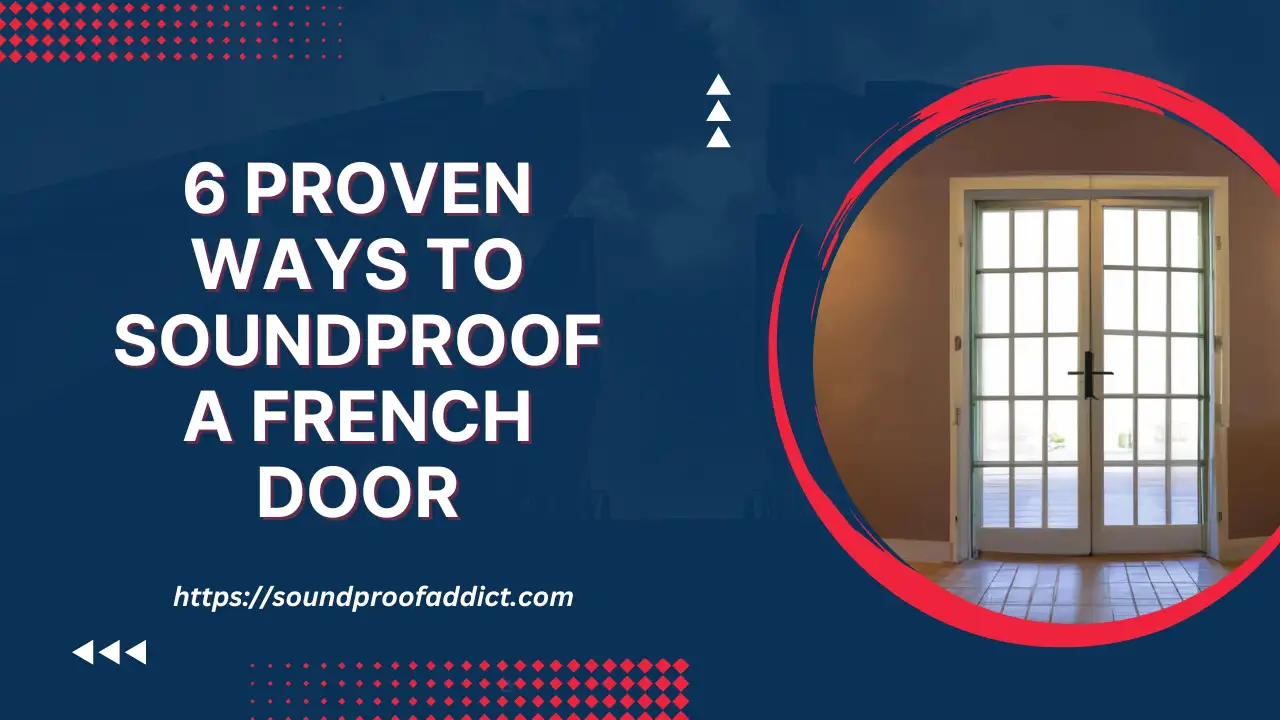
It is not wrong to say that French doors are trending right now. Many people are choosing French doors over others due to the beauty and versatility of these doors.
I also installed a new French door last month. Well, there are a ton of advantages to talk about French doors, but there is a disadvantage as well and that’s: Noise, which you may have experienced already.
This is because the design and the structure of French are not so-good for blocking sound effectively, which results in a lot of sound getting into the room.
So if you are dealing with this problem and looking for ways to soundproof your French door then you are where you should be.
Today, I’m going to share six effective ways to soundproof a French door. So let’s jump into the world of soundproofing.
How does sound travel through a French door?
French doors today are like the old French windows with two glass panels. Sound travels through a French door similarly to other doors. When sound originates on one side, vibrations move through the glass panels due to air interacting with the glass.
Thicker glass reduces sound transmission, while gaps and thin panels let some sound pass. Energy from sound waves transfers to the glass, which causes vibration.
Some sound energy reflects off the glass, the rest transmits through. On the other side, vibrations in the glass interact with air molecules and sound continues. Glass thickness, gaps, and frame material affect sound transmission.
6 Proven Ways To Soundproof a French Door
1: Seal all the gaps
Sealing gaps is the name of the game when it comes to soundproofing a French door. Any little gap in the door can be an entry point for noise to sneak in.
So sealing properly should be your first priority when making a French door soundproof. To find gaps in your door to seal, check the perimeter of the door frame where it meets the wall.
Gaps can form between the frame and the wall due to uneven installation, or natural wear and tear over time. To seal these gaps, use adhesive-backed foam weatherstripping. Just cut the weatherstripping to fit the lengths of the frame. Peel off the backing and press the weatherstripping into place.
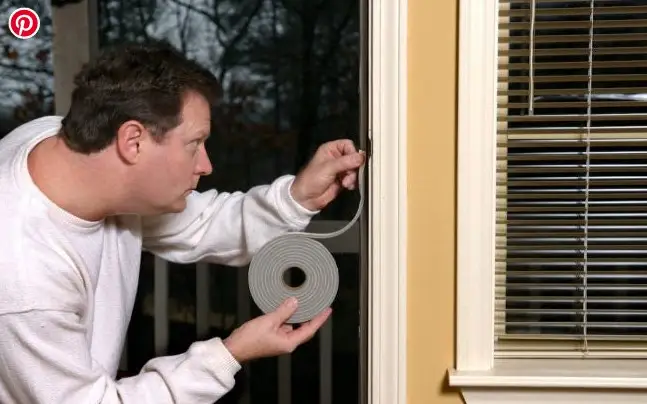
Also, take a look at the bottom of your French door, the gap between the bottom of the door and the floor is common and these gaps allow a lot of sound leakage.
To block the gap at the bottom of your door, attach a door sweep to the inside bottom of the door using screws. And, if your French door has multiple panels, there might be small gaps between these panels.
Depending on the size of the gap, you can use a couple of methods. For smaller gaps, I would recommend using a vinyl gasket weatherstrip. For larger gaps, you might need to consult a professional to evaluate the best solution.
2: To soundproof a French door, Install a soundproof window inserts
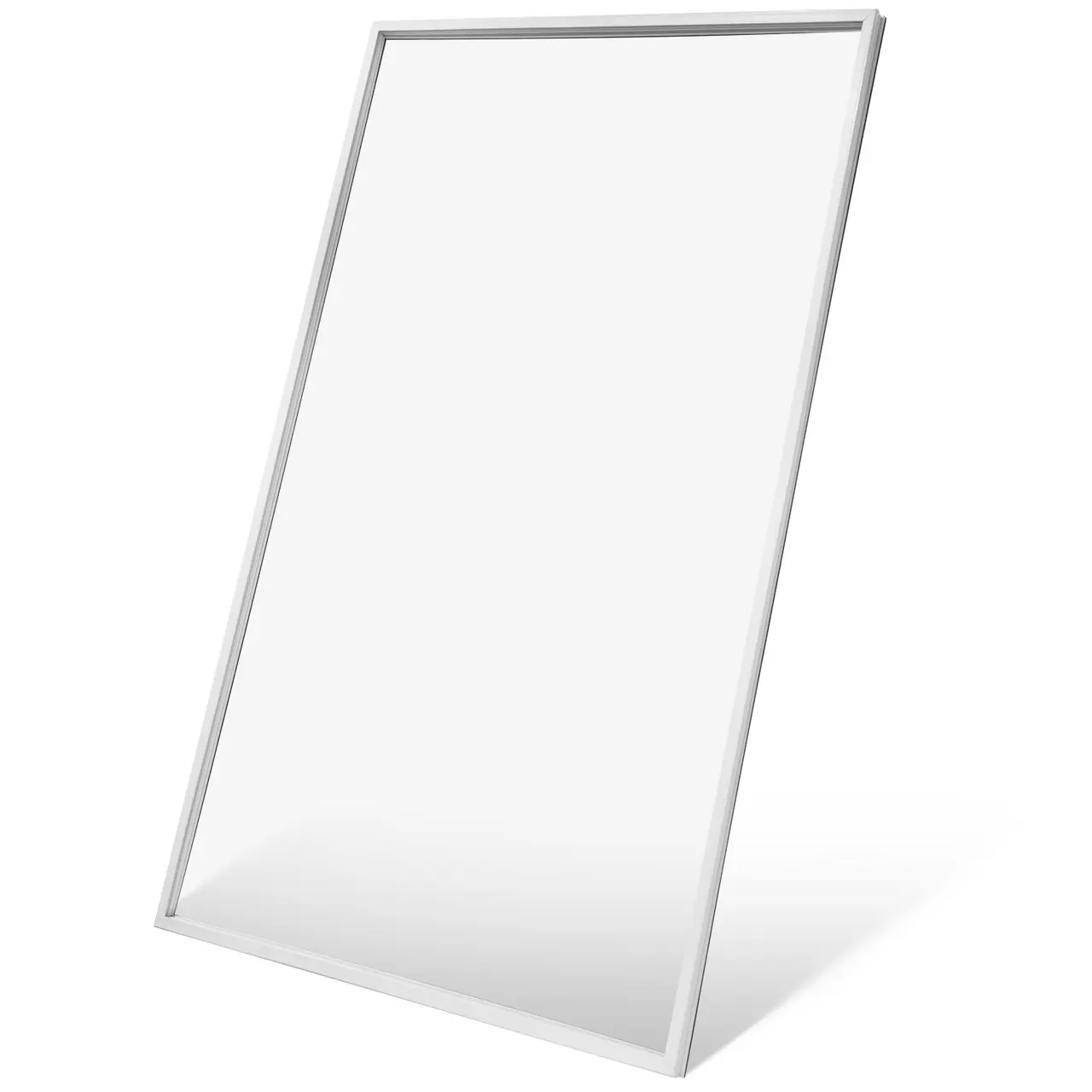
In my opinion, the best way to soundproof a French door is to install window inserts. You might be wondering what the hell I am talking about.
But here is the thing: As we all know, French doors have windows and believe it or not, most of the sound passes through these windows.
And by soundproofing these windows you will be able to reduce noise coming in to a significant level. And the best to do so is to install soundproof window inserts.
Soundproof window inserts are basically the panels that you place over a window to help stop noise from coming in. They are mostly used in soundproofing windows. The inserts have glass, so they will still let light through.
In my perspective, the best soundproof window inserts in the market right now is Fantastic Frame™ Soundproof Window Inserts which reduce sound by up to 80% according to secondskinaudio.com. That’s huge.
However, this French door soundproofing technique is going to be costly. The starting price of window inserts that I motioned earlier is $284.99, which will increase according to the size you need. Of course, you will need to customize one for your French door.
Other than that, installation can also be complicated for you if you are not a DIY enthusiast, so it will be best to have an expert to handle the installation.
3: Hang soundproofing blankets
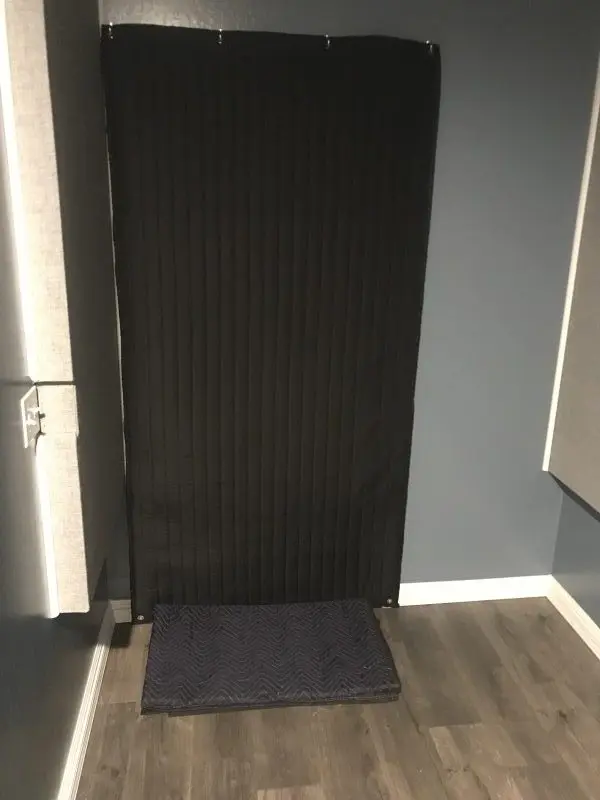
If you are looking for an easy, quick and affordable way for soundproofing your French door then soundproofing blankets is your go-to solution.
Whether you are soundproofing a hollow door, making a pocket soundproof or a barn door, soundproofing blankets can help.
If you have read my previous posts, you will notice that I have mentioned these blankets in almost every post and the reason for this is that these blankets really work.
They absorb the sound effectively and try to pass through them. Soundproofing blankets need to be hung as they come with grommets. You will need to hang them over your French door to reduce the noise coming through.
Soundproofing blankets these days are more effective as compared to what they were in the past. A good quality regular soundproofing blanket may cost you $70 to $150 and can reduce noise levels by 10 dB.
To install these blankets, put a few suction hooks on the back of your French door and then just hook the blanket on the hooks. That’s it!
Other than that, you can also use acoustic blanket for soundproofing bathroom door.
4: Hang a MLV curtain
You might have heard about hanging soundproofing curtains for soundproofing a door. But you might have heard about hanging an MLV curtain for soundproofing the door.
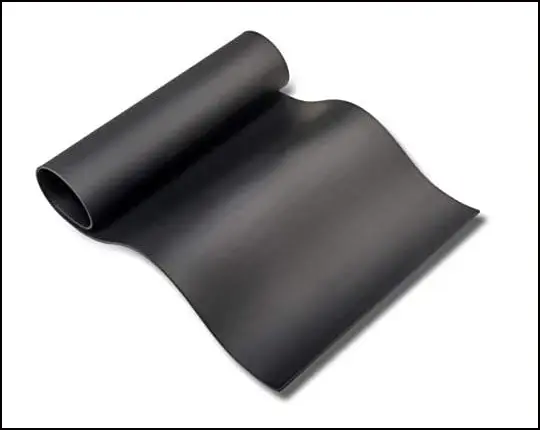
Yes, I know soundproofing curtains are effective at reducing the noise, but MLV curtains are way more effective than that. MLV curtains are best option for garage door noise reduction and for condo door noise-proofing.
Mass Loaded Vinyl (MLV) curtains are an advanced and effective way to enhance the soundproofing of your French door. Mass Loaded Vinyl (MLV) is a dense and flexible material engineered to block the propagation of sound.
However, the disappointing thing is that there is hardly any MLV curtain available on the market. If there is one then it is very expensive. So it is best to create your own DIY MLV curtain. Here is a step-by-step guide to create it
Materials Needed:
- Mass Loaded Vinyl (MLV) roll
- Fabric for curtain cover
- Scissors
- Sewing machine
- Curtain rod and hardware
- Measuring tape
Step 1: Measure and Cut:
Measure the dimensions of the area you want to cover with the MLV curtain, making sure it’s slightly larger than the door area. And cut the MLV roll to match the measurements you’ve taken.
Step 2: Prepare the Fabric Cover:
Cut the fabric you’ve chosen for the curtain cover, ensuring it’s slightly larger than the MLV piece. Now, hem the edges of the fabric to prevent fraying. Sew the top edge to create a pocket for the curtain rod to go through.
Step 3: Attach the MLV to the Fabric Cover:
Lay the MLV piece flat on a surface. Lay the fabric cover over the MLV, aligning the top edge with the top edge of the MLV. If you want, you can even use fabric on both sides of the MLV.
Now, it’s time to sew. Sew along the sides and bottom edge of the fabric, attaching it to the MLV. Keep in mind to leave the top edge open for the curtain rod pocket.
Step 4: Hang the Curtain:
Now that your DIY MLV curtain is all set, it’s time to hang it up over the French door using a curtain rod. Simply slide the curtain onto the rod through the pocket you made earlier, and you’re good to go!
5: Replace the door with a Double glazed French door
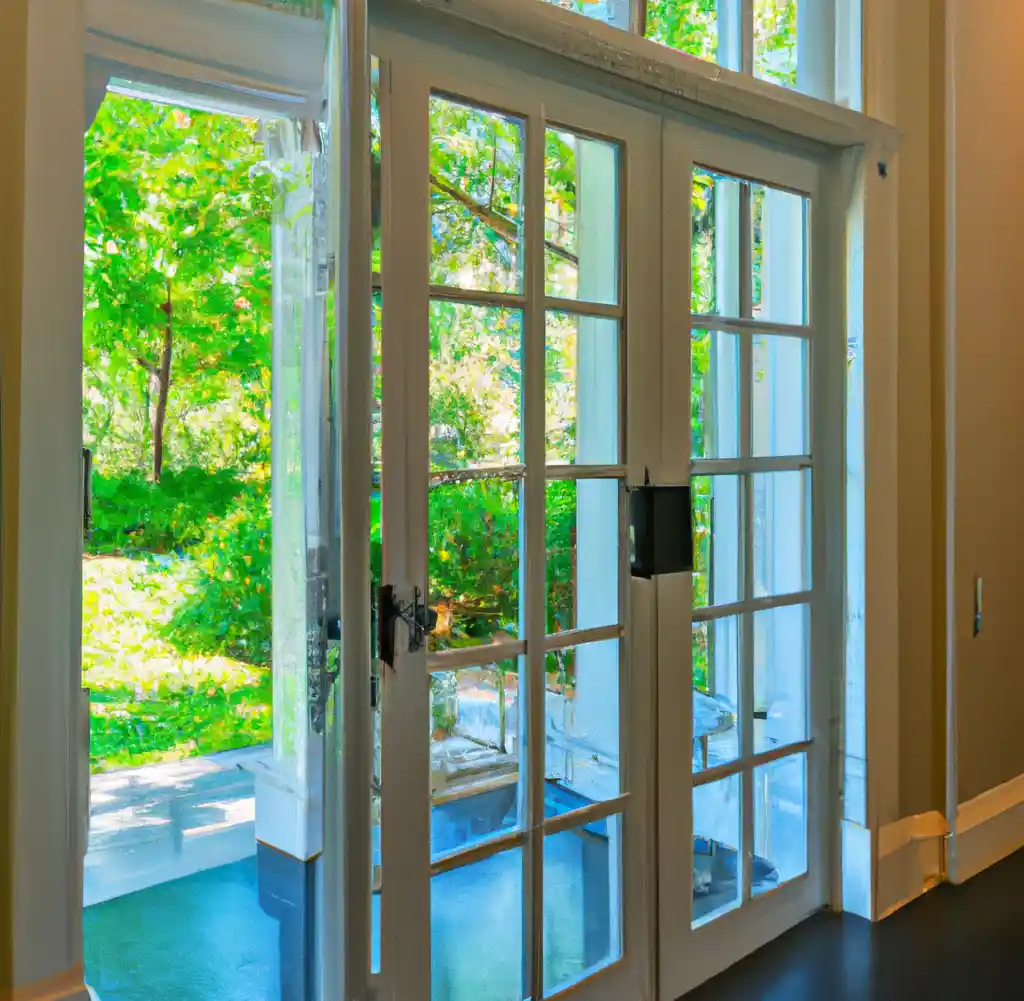
Replacing your existing French door with a double-glazed one is a comprehensive, more permanent and effective solution for soundproofing.
Double-glazed doors basically have two layers of glass with a layer of air or inert gas in between, offering better insulation against noise compared to standard French doors.
According to Bradnmas, double-glazed French doors can block sound by 60% more than those that have single-glazing. Now, here’s the thing – these doors cost more than regular doors due to the added materials.
According to Allie Ogletree from Angi, a double-pane glass French door may cost you anywhere between $700 – $3,000 which is steep.
But it is totally worth it as they offer significant benefits in terms of soundproofing and energy efficiency.
However, not all double-glazed doors are created equal. Look for doors with thicker glass and gas-filled insulation, as these features enhance soundproofing capabilities.
And also, if installing a double-glazed French door is not possible for you then consider hiring a pro to handle it. While some homeowners with DIY experience might be able to install a double-glazed door, if you can do it too then you will save the installation cost.
Read this post: (how to install a French door) to save the installation cost.
Related: How to make a sliding glass door soundproof?
6: Attach plywood or drywall sheet on the both sides of the door
If you have an older French door and you’re on the lookout for an affordable and efficient way to soundproof it, consider using plywood or drywall to reinforce it. This is a do-it-yourself approach that adds weight and density, boosting door’s ability to block out sound.
Drywall is a super effective and blocking out sound. According to Thespruce, using a single layer of drywall on each side can have almost as much soundproofing: STC 52. And plywood is also somewhat effective at reducing the noise to some extent.
But I also let you know that drywall is also costlier than plywood. As reported by Forbes, the average cost of drywall per square foot of wall surface ranges from $1.50 to $4.00, which translates to approximately $15 to $60 per panel.
On the other hand, according to EZwoodshop, a sheet of plywood can cost anywhere from $5.97 to $44.97. Anyway, you can pick the option that aligns with your budget, but the installation process remains the same.
Cut the plywood sheets to your door dimensions, position the sheet and use heavy-duty screws to secure one side first before moving to the opposite side. Be sure to screw them in properly into the door every 6 to 8 inches along the edges.
If you are going with plywood, then choose one that is thicker such as 3/4-inch (19mm), and is more effective for soundproofing due to its greater mass. When using drywall, it’s a good idea to select a thickness of around 1/2 inch (12mm) or thicker.
Related: How to make a Louvered door soundproof?
How do you soundproof interior French doors?
To soundproof interior French doors, begin by sealing all gaps with weather-stripping and a door sweep to prevent sound leakage. Additionally, consider using soundproofing curtains or blankets that are heavy and dense. This can help you reduce the noise transfer in an interior door effectively.
Related: Top noise reducing curtains for door in 2023
Conclusion
Within the article, we’ve outlined six distinct approaches. But I think the easiest and most effective way is to put soundproof window inserts that stop sound into your door.
This solution stands out due to its remarkable effectiveness and cost-effectiveness in comparison to the alternative of replacing the door with a double-glazed French door.
Using an MLV curtain is also an effective option and blankets are also a good option to try. For soundproofing old French doors, attaching plywood or drywall sheets on both sides of the door is also very powerful. But this option can block your view through the door.
For soundproofing interior French doors, blankets and curtains are your go-to solution. Sealing gaps are fundamental that you have to do anyhow if you see a gap, it does not matter whether you are soundproofing an interior or exterior door.
That’s it for the post: How to soundproof a French door. I hope this article proves to be useful and informative for you and helps you to choose the most effective method for soundproofing your French door.
Thank you for exploring our guide! Happy soundproofing!
Related: How to soundproof bi-folding doors?
